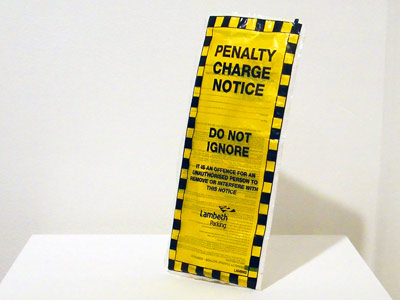joint projects
Lot 10


Penalty Charge Notice
Date: 2009
Contents: Pre-pay envelope and payment slip in plastic rainguard
‘What will I do for public transport? I will improve the economy so you can find good enough work to be able to afford a car’.
- George W Bush, US President, campaign speech
Another great myth offered by late capitalism which grew steadily through the 20th and early 21st century was that of the personal ownership of a motor car.
Popularised by early car maker, Henry Ford, the cult of ‘freedom to travel’, or in Fords own words “the blessings of hours of pleasure in gods great open spaces”, flourished until 2008.
The last statistics produced by the ‘Department of Transport’ in the then ‘United Kingdom’ stated that 75% of households owned at least one motor car. This reflected an absurd doctrine promoted by the industrial/political elite that saw ownership not only as (a) right, but even worse a necessity.
One leading light, the former British Prime Minister Margaret Thatcher, was even reported as saying - ’Any man who rides a bus to work after the age of 30 can count himself a failure in life’.
The irrational pre-occupation with the ‘right to private transport’ in cities continued into the second decade of the 21st century. Its eventual wholesale collapse occurred just six months after the last major road building project was abandoned.
This highly collectable ‘Penalty Charge Notice’ was issued by Lambeth council on the 12th October 2009. In keeping with the spirit of traffic engineers (see lot 2), it records the issuing of a £60 fine, even though I was only fleetingly parked adjacent to a dropped footway whilst loading a ‘double buggy’ (see lot 1).

Provenance
Bristol is the largest importer of cars to the UK. In 2007 the port, which has its own police constabulary, handled over 650,000 vehicles for a range of customers. For example, all Honda imports into the UK are directed through Bristol and Mitsubishi Motors has 57 acres of storage on the site for its entire UK import of vehicles from the Far East and Northern Europe.
Since 1991 the port has been operated by a private firm, the Bristol Port Company.
The company has become a vocal opponent of the Severn Barrage renewable energy scheme, which it says would be a “major impediment” to its plans to turn the port into one of the biggest deep sea container terminals in the country.1
In 2007 the Bristol Port Company’s retained lobbying firm, Waterfront, was tasked with constructing what it describes as “a broad-based coalition campaign in order to raise awareness and opposition to a proposed Severn Barrage”. It duly set up the ‘Stop the Barrage NOW’ campaign, created the group’s website and produced a media and ‘stakeholder’ strategy “using [parent company] Freshwater’s expertise in order to help with the public relations branding of the campaign.” According to its website, Waterfront also “worked alongside parliamentarians… to develop a coherent strategy for attacking the Severn Barrage.” 2
The Stop the Barrage NOW campaign group is widely quoted is the press without the input of the Bristol Port Company’s lobbying firm ever being revealed.
1 Barrage Threat to ‘Superport’, Western Daily Press, 7 June 2008
2 Stop the Barrage Now campaign: www.freshwater-uk.com